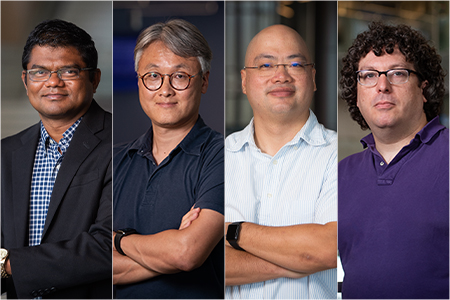Career calling
Researchers receive prestigious early career awards
By Taylor Provine
 Three Kansas State University researchers have recently received Faculty Early Career Development, or CAREER, awards, which are the National Science Foundation’s most prestigious awards for early career faculty members. Another researcher recently received a U.S. Department of Energy Office of Science Early Career Research Program award, which supports exceptional researchers during their formative early career years.
Three Kansas State University researchers have recently received Faculty Early Career Development, or CAREER, awards, which are the National Science Foundation’s most prestigious awards for early career faculty members. Another researcher recently received a U.S. Department of Energy Office of Science Early Career Research Program award, which supports exceptional researchers during their formative early career years.
Suprem Das
Assistant professor of industrial and manufacturing systems engineering
Carl R. Ice College of Engineering
AREA OF STUDY: Atomically thin nanoscale materials and nanosensors and their advanced manufacturing processes
AWARD: $500,000 NSF CAREER award
PROJECT TITLE: “Rational design of one-dimensional contacts to two-dimensional atomically thin heterostructure for high-performance and low noise field-effect transistors and biosensors”
PROJECT DESCRIPTION: Das and his team are studying how electrons flow and give rise to sensitive signals in atomically thin materials and state-of-the-art devices made of them, such as graphene and encapsulated graphene by hexagonal boron nitride. They are trying to understand how the motion of electrons is affected by impurity atoms that are present in the surrounding — often giving rise to noisy signals. The findings will be used to build ultra-sensitive electronic devices from these atomically thin materials and their nano-engineered structures, Das said.
“This is an integrated research and education project in which students from diverse backgrounds, including women and underrepresented candidates, will be trained on highly interdisciplinary topics such as nanoscale materials, device physics, device engineering and advanced manufacturing,” said Das, also a Jeffrey and Joy Lessman — Carl and Mary Ice Keystone research scholar in the college.
Jeongdae Im
Assistant professor of civil engineering
Carl R. Ice College of Engineering
AREA OF STUDY: Environmental microbiology and biotechnology
AWARD: $600,000 NSF CAREER award
PROJECT TITLE: “Mechanisms and control of nitrous oxide emissions from forage conservation”
PROJECT DESCRIPTION: This project focuses on forage conservation process as an unaccounted source of nitrous oxide — the third most important greenhouse gas and the largest remaining threat to the ozone layer. Currently, nitrous oxide emission inventories from agriculture only track emissions from soil management, manure management and field burning of agricultural residues, Im said.
“This project will use a laboratory and field research program to quantify nitrous oxide emissions in forage conservations and investigate the microbial processes that control such emissions,” said Im, also a Jeffrey and Joy Lessman Keystone research scholar. “The successful completion of this project will benefit society through the generation of new data and fundamental knowledge to quantify, manage and mitigate the emissions of non-CO2 greenhouse gases from various environmental sources.”
Hongyu Wu
Associate professor of electrical and computer engineering
Carl. R. Ice College of Engineering
AREA OF STUDY: Smart grid cyber-physical security
AWARD: $500,000 NSF CAREER award
PROJECT TITLE: “Toward attack-resilient cyber-physical smart grids: moving target defense for data integrity attack detection, identification and mitigation”
PROJECT DESCRIPTION: According to Wu, threats of cyberattacks targeting power systems are growing in number and sophistication. His project aims to enhance the resiliency of cyber-physical power grids by providing a theoretical foundation and design-guiding principles that will unlock the full potential of moving target defense approaches.
“The broader impacts of the project include promoting public awareness and understanding of smart grid cybersecurity, contributing to power engineering education, and preparing a diverse learning community, including middle and high school students, with requisite knowledge and skill sets to tackle future power grid security challenges,” said Wu, also a Michelle Munson-Serban Simu Keystone research scholar and the Lucas-Rathbone professor in the Mike Wiegers Department of Electrical and Computer Engineering.
Loren Greenman
Associate professor of physics
College of Arts and Sciences
AREA OF STUDY: Ultrafast dynamics in molecules
AWARD: $750,000 DOE Early Career Scientists for Mission-Critical Research grant
PROJECT TITLE: “Theory of the femtosecond and attosecond dynamics of molecules in complex regions of their potential landscapes”
PROJECT DESCRIPTION: Greenman and his team are studying how they can control small molecules at the femtosecond and attosecond time scales, which are one quadrillionth of a second and one quintillionth of a second, respectively. As a theory group, they are using supercomputers to model these processes and develop schemes to control the dynamics at these time scales.
“By understanding the basic science of how these fundamental building blocks of nature interact at these incredibly fast time scales, we expect to learn about their interactions and how energy is transferred in these systems,” Greenman said. “Other groups can then build on this knowledge with varying applications, such as better solar photovoltaics or understanding photosynthesis among other biological processes.”